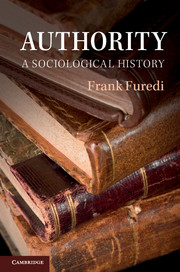Book contents
- Frontmatter
- Contents
- Preface
- Introduction: always in question
- 1 Thersites and the personification of anti-authority
- 2 Socrates and the quest for authority
- 3 Rome and the founding of authority
- 4 Augustus: a role model for authority through the ages
- 5 Medieval authority and the Investiture Contest
- 6 Medieval claim-making and the sociology of tradition
- 7 Reformation and the emergence of the problem of order
- 8 Hobbes and the problem of order
- 9 The rationalisation of authority
- 10 The limits of the authority of the rational
- 11 Taming public opinion and the quest for authority
- 12 Nineteenth-century authority on the defensive
- 13 Authority transformed into sociology's cause
- 14 The rise of negative theories of authority
- 15 By passing authority through the rationalisation of persuasion
- 16 In the shadow of authoritarianism
- Conclusion: final thoughts
- Bibliography
- Index
8 - Hobbes and the problem of order
Published online by Cambridge University Press: 05 June 2014
- Frontmatter
- Contents
- Preface
- Introduction: always in question
- 1 Thersites and the personification of anti-authority
- 2 Socrates and the quest for authority
- 3 Rome and the founding of authority
- 4 Augustus: a role model for authority through the ages
- 5 Medieval authority and the Investiture Contest
- 6 Medieval claim-making and the sociology of tradition
- 7 Reformation and the emergence of the problem of order
- 8 Hobbes and the problem of order
- 9 The rationalisation of authority
- 10 The limits of the authority of the rational
- 11 Taming public opinion and the quest for authority
- 12 Nineteenth-century authority on the defensive
- 13 Authority transformed into sociology's cause
- 14 The rise of negative theories of authority
- 15 By passing authority through the rationalisation of persuasion
- 16 In the shadow of authoritarianism
- Conclusion: final thoughts
- Bibliography
- Index
Summary
The problem of establishing a compelling foundational norm for authority has haunted modern society since the seventeenth century. Virtually every political crisis has been accompanied by a sense of uncertainty about how to secure a legitimate grounding for power. The clarity with which Thomas Hobbes grasped the meaning of this issue, and his understanding of the need for a fundamentally novel form of authorisation, endows his contribution with an enduring legacy. Hobbes's Leviathan (1651) represents one of the most ambitious attempts to rethink the relationship between power and authority, and time and again it would be looked to for inspiration. As the political scientist Richard Flathman writes:
IF there is a single most perspicuous account or analysis of the concept of authority, and IF there is a single most compelling normative conception of authority, then that account and that conception find their origin and one of their most forceful articulations in the writings of Thomas Hobbes.
Unlike most of his contemporaries, Hobbes comprehended the scale of the socioeconomic and political change that divided his era from medieval times. The upheaval of European society, particularly that of his own strife-ridden England, forced Hobbes to understand that previous varieties of traditional authority could not be revived.
What is particularly interesting about Hobbes's political theory is that, as well as constructing a new argument for the validation of a stable order, he offered a critique of the failure of previous foundational norms on which authority was based. Although dominated by the issues that directly confronted him, the very attempt to distance his Leviathan from past conceptions of authority illustrates a very modern sensibility. Hobbes's historical critique of authority is directed at the ‘orthodoxy developed by the Christian tradition’ that made ‘the rightness of opinion’ the foundation for authority. Hobbes claimed that such opinions, which were interpreted by groups of priests, intellectuals and lawyers, inevitably led to conflicts of dogma, with destructive consequences. Kraynak notes that ‘the conclusion of Hobbes's historical writings, therefore, is that civilization had been characterized by the establishment of authoritative opinions and the disputation of these opinions, rendering it not merely unstable but positively self-destructive’.
- Type
- Chapter
- Information
- AuthorityA Sociological History, pp. 181 - 205Publisher: Cambridge University PressPrint publication year: 2013



